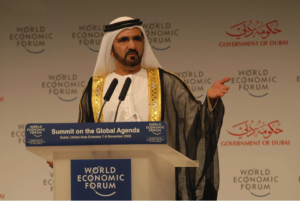UAE Plans Spacecraft Trip to Mars
The United Arab Emirates (UAE) intends to be the first Arab and Muslim country to send a spacecraft to Mars. The project manager of the Mission to Mars, Omran Sharaf, announced that the mission completed the Preliminary Design Review on time for the planned launch date in July 2020. After seven months, the unmanned spacecraft would reach Mars to conduct detailed tests on the planet’s atmosphere. Additionally, Sharaf hopes the mission will promote STEM interest in the Arab world, one of the stated initiatives of the country’s space investment program. The spacecraft, named Hope, will be launched in Japan using a Japanese launch vehicle. If successful, the UAE will join the five other countries, (including the European Space Agency), in orbiting Mars.
Space scientists around the world, including the President of the International Astronautical Federation Jean-Yves Le Gall, emphasize the importance of the mission in exploring the possibility of life on Mars. The atmospheric and climate tests have the potential to reveal how life could survive on the planet, including human habitation. However, the General Authority of Islamic Affairs and Endowment of the UAE issued a fatwa, an Islamic legal pronouncement, forbidding Muslims from travelling on a one-way trip to Mars, since the inherent danger is an unjustifiable risk of life and equivalent to suicide.
UAE officials laud the mission for its ability to bolster or even create economic sectors. A strong aerospace industry would not only diversify the Emirati economy but would foster technological advancements that would strengthen the economic position of the country. For example, Dr. Melikechi, a dean at the University of Massachusetts, said the laser technology used in the Mars mission could be developed further to detect cancer. In the Global Space Congress in Abu Dhabi, the UAE Space Agency Chairman al-Rumaithi stated that among other technological industries, the UAE could develop space tourism. The economic and scientific progress from such developments would be controlled and supported by the country’s upcoming space laws, which regulate profiting from exploration and the organization of space missions.
One of the next steps in the country’s space program is to explore the viability of sending astronauts into space. Scientists hope that the interest generated by the Mars mission will encourage the nation’s youth to pursue the innovation required for the complexity of a human visit. Because recent developments in the space sector have been slow, the Hope spacecraft could propel the industry to a breakthrough.
Since creating the space agency in 2014, the UAE has also developed other aerospace projects. Before the end of February 2017, a nanosatellite (a smaller type of satellite that is easier to launch) called Nayif-1 will launch from a space center in India. Engineering graduates at the American University of Sharjah, in cooperation with the bin Rashid Space Center in Dubai, designed it. Among this team, four of the students will work on the Hope mission as well.

